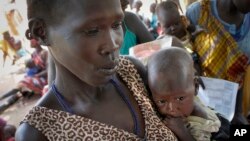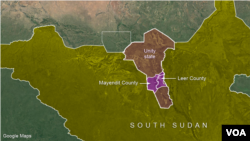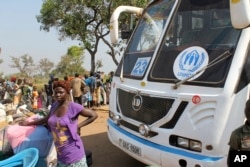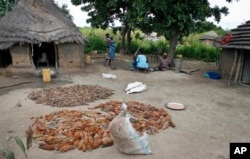Famine can be added to the list of South Sudan’s problems, according to the government and the U.N. International Children’s Fund, Food and Agriculture Organization, and World Food Program.
They say conflict, a collapsing economy, high food prices, and low agricultural production are to blame for food insecurity across the country, and for famine in two counties in southern Unity State, affecting more than 100,000 people, with the threat of spreading further.
“That means that the conditions have deteriorated to pretty much the worst on the scale that we use to measure food security,” said Challiss McDonough, spokeswoman for the U.N. World Food Program in East Africa, explaining the joint technical committee’s conclusion.
“You have got nutrition rates that are astronomical, you have got people with very limited access to food, the mortality rate is above the level that’s required, so they have announced that although you have got a bad food security situation throughout the country, that in those two specific counties, things are about as bad as they can get.”
Intense conflict
While many people are struggling with food insecurity, McDonough says there is a reason famine has struck these two areas in particular.
“It is because the conflict has been intense there, or there have been a lot of different armed groups,” said McDonough. “It has been very difficult to negotiate safe access, both for the aid workers and for the people who have been trying to assist, so that you can be sure that if you go in and give food and other types of assistance to people, that they are not going to be attacked because of the food.
One million people are classified as being on the brink of famine. According to numbers released by the government and the United Nations, an estimated five million South Sudanese are severely food insecure, a number projected to increase to 5.5 million people, or roughly half of South Sudan’s population, by July.
Isaiah Chol Aruai, chairman of South Sudan’s National Bureau of Statistics, released a statement acknowledging the concerns of this projection and urging “all actors to scale up their efforts in the coming months in order to prevent further deterioration of food insecurity and malnutrition in the country.”
Agricultural development
The agricultural sector in South Sudan is undeveloped under usual conditions, according to McDonough, but the current situation prevents people from improving it.
“If we had peace and could work on agricultural development, then yes, in the long run, there is enormous potential for South Sudanese agriculture; but, you cannot farm when you are fighting, or you cannot farm when it is not safe to go into your fields because somebody else is fighting,” she said.
Since the start of the war in December 2013, tens of thousands of people have died. The U.N. refugee agency says that neighboring Uganda has more than tripled its population of South Sudanese refugees in less than six months, bringing the total number to almost 700,000, as people continue to flee.
The United Nations is also expressing concern that "critical shortages in food assistance are affecting some two million refugees in 10 countries across Africa."







